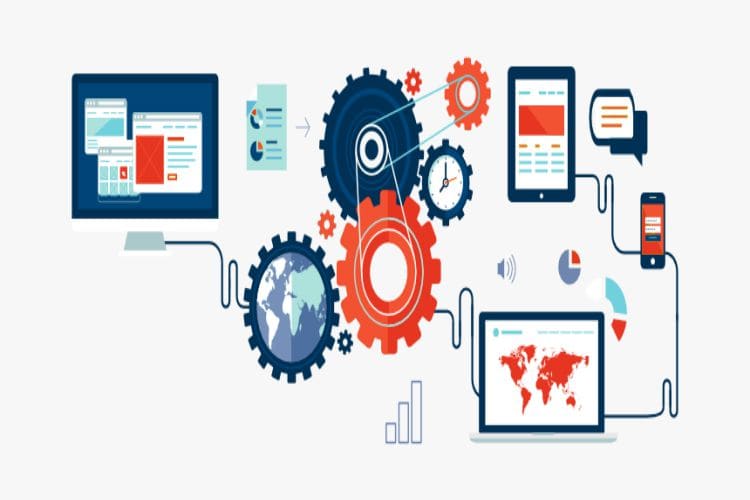 As we approach 2025, the realm of custom LMS development is experiencing a seismic shift, redefining the very essence of organizational learning and development. Companies are increasingly recognizing the transformative power of tailored learning ecosystems in fostering innovation, agility, and sustainable growth. At the forefront of this educational revolution stands custom LMS development, with industry trailblazers like Aristek spearheading groundbreaking solutions that are reshaping the future of corporate learning. This article delves into the cutting-edge trends that will define custom LMS development in 2025 and beyond, offering a visionary glimpse into the future of organizational knowledge acquisition and skill cultivation.
As we approach 2025, the realm of custom LMS development is experiencing a seismic shift, redefining the very essence of organizational learning and development. Companies are increasingly recognizing the transformative power of tailored learning ecosystems in fostering innovation, agility, and sustainable growth. At the forefront of this educational revolution stands custom LMS development, with industry trailblazers like Aristek spearheading groundbreaking solutions that are reshaping the future of corporate learning. This article delves into the cutting-edge trends that will define custom LMS development in 2025 and beyond, offering a visionary glimpse into the future of organizational knowledge acquisition and skill cultivation.
Artificial Intelligence and Cognitive Computing: The New Learning Frontier
By 2025, Artificial Intelligence and cognitive computing will be deeply integrated into custom LMS platforms, offering unprecedented levels of personalization and adaptivity:
- Cognitive Learning AssistantsAdvanced AI-powered learning assistants will evolve beyond simple chatbots, offering sophisticated, context-aware support throughout the learning journey. These assistants will leverage natural language processing and machine learning to engage in nuanced dialogues, answer complex queries, and provide personalized guidance.
- Predictive Learning Path OptimizationMachine learning algorithms will analyze vast datasets of learner behavior, performance metrics, and career trajectories to dynamically optimize individual learning paths. These systems will predict skill gaps before they emerge and proactively suggest learning interventions aligned with both organizational needs and personal career aspirations.
- Emotion-Aware Content DeliveryLeveraging advances in affective computing, custom LMS platforms will incorporate emotion recognition technology to detect learners’ emotional states through facial expressions, voice tone, and physiological signals. This emotional intelligence will allow the system to adjust content delivery, pacing, and difficulty in real-time to maintain optimal engagement and minimize frustration.
- AI-Driven Content Creation and CurationNatural language generation and computer vision technologies will assist in creating and curating learning content at scale. AI systems will automatically generate quizzes, summaries, and even adapt existing content for different learning styles or cultural contexts, ensuring a constant flow of fresh, relevant learning materials.
Immersive Technologies and Extended Reality (XR) Learning
The integration of immersive technologies in custom LMS development will create deeply engaging and effective learning experiences:
- Photorealistic Holographic TelepresenceAdvanced holographic technology will enable lifelike telepresence for remote instructors or subject matter experts, creating immersive virtual classroom experiences that blur the line between physical and digital learning environments.
- Haptic-Enhanced Skill AcquisitionSophisticated haptic feedback systems will be integrated into VR and AR experiences, allowing learners to develop fine motor skills and muscle memory in virtual environments. This will be particularly valuable for training in fields like surgery, manufacturing, and fine arts.
- Adaptive Mixed Reality SimulationsAI-driven mixed reality simulations will dynamically adjust scenario complexity based on learner performance, creating highly personalized and challenging learning experiences that adapt in real-time to the learner’s skill level.
- Neuro-Responsive Virtual EnvironmentsIntegration with non-invasive brain-computer interfaces will allow virtual learning environments to respond to learners’ cognitive states, adjusting difficulty, pacing, or even environmental factors to maintain optimal cognitive load and engagement.
Blockchain and Decentralized Learning Ecosystems
Blockchain technology will revolutionize how learning is validated, shared, and monetized:
- Verifiable Skill GraphsBlockchain will enable the creation of comprehensive, tamper-proof “skill graphs” that map an individual’s competencies, experiences, and credentials across their entire career. These graphs will provide a more nuanced and verifiable representation of a person’s capabilities than traditional resumes or certificates.
- Decentralized Autonomous Learning Organizations (DALOs)Blockchain-powered DALOs will emerge as new models for collaborative learning and knowledge sharing. These self-governing entities will allow communities of learners and experts to collectively create, curate, and monetize learning content without centralized control.
- Token-Based Incentive SystemsCustom LMS platforms will incorporate sophisticated token economies built on blockchain, incentivizing not just course completion, but also peer teaching, content creation, and real-world application of skills. These tokens could have tangible value within organizational ecosystems or even broader labor markets.
- Smart Contract-Based Adaptive Learning AgreementsBlockchain-enabled smart contracts will power adaptive learning agreements that automatically adjust based on learner progress and performance. These contracts could govern everything from course access and certification to tuition reimbursement and performance bonuses.
Neuroscience-Informed Learning Design
Advancements in neuroscience will significantly influence custom LMS development:
- Neuroplasticity-Optimized Learning SchedulesCustom LMS platforms will leverage insights from neuroscience to create learning schedules that optimize for periods of heightened neuroplasticity. This could involve algorithms that identify individual “critical periods” for skill acquisition and tailor learning interventions accordingly.
- Cognitive Load BalancingReal-time EEG monitoring integrated with LMS platforms will allow for dynamic adjustment of content complexity and presentation based on measured cognitive load, ensuring learners remain in an optimal state for information processing and retention.
- Memory Consolidation-Enhancing FeaturesLearning experiences will be designed to enhance memory consolidation processes, incorporating techniques like sleep-learning integration, where key concepts are subtly reinforced during sleep cycles through audio cues.
- Neurofeedback-Driven Focus TrainingCustom LMS platforms will incorporate neurofeedback training modules to help learners improve attention, focus, and cognitive control, enhancing their overall learning capacity.
Internet of Things (IoT) and Ambient Intelligence
The proliferation of IoT devices will extend learning beyond traditional interfaces, creating an ecosystem of ambient intelligence:
- Context-Aware Microlearning TriggersIoT sensors throughout the workplace will detect contextual cues (location, activity, time of day) to trigger relevant microlearning interventions, providing just-in-time performance support and continuous learning opportunities.
- Biometric-Responsive Learning EnvironmentsSmart learning environments will automatically adjust lighting, temperature, ambient noise, and even air quality based on biometric data from wearable devices, optimizing physical conditions for learning and cognitive performance.
- Gesture-Controlled Augmented Reality InterfacesAdvanced gesture recognition technology will allow learners to interact with AR learning content through natural hand movements, creating intuitive, hands-free learning experiences in various work contexts.
- Swarm Learning NetworksIoT devices will form swarm intelligence networks, collectively analyzing patterns of learner behavior and environmental factors to continuously optimize the learning ecosystem across an entire organization.
Advanced Analytics and Prescriptive Insights
The use of data in custom LMS development will become increasingly sophisticated and actionable:
- Quantum-Inspired Optimization AlgorithmsWhile full-scale quantum computing may not be widely available by 2025, quantum-inspired algorithms will enhance the capabilities of classical computers in analyzing complex learning ecosystems, uncovering non-obvious patterns and optimization opportunities.
- Digital Twin Simulations for Learning EcosystemsOrganizations will create digital twin simulations of their entire learning ecosystems, allowing for sophisticated scenario planning and impact analysis of different learning strategies.
- Prescriptive Analytics for Skill DevelopmentAdvanced analytics engines will not only predict future skill needs but also prescribe specific learning interventions, career moves, and project assignments to optimize an individual’s skill development trajectory.
- Real-Time ROI MeasurementSophisticated analytics will provide real-time measurement of learning ROI, directly linking learning activities to business KPIs and enabling dynamic reallocation of learning resources for maximum impact.
Gamification and Immersive Storytelling
Gamification in custom LMS development will evolve to create deeply engaging, narrative-driven learning experiences:
- AI-Generated Personalized Learning NarrativesMachine learning algorithms will dynamically generate personalized learning narratives that adapt based on individual learner choices, performance, and preferences, creating unique, story-driven learning journeys for each user.
- Physiologically Adaptive Game MechanicsBiometric data from wearable devices will influence game mechanics in real-time, adjusting difficulty, pacing, or narrative tension based on the learner’s physiological responses to maintain optimal engagement and challenge.
- Collective Intelligence GamingMulti-user VR environments will host complex, collaborative problem-solving simulations that leverage collective intelligence, encouraging teams to tackle real-world organizational challenges in immersive, gamified environments.
- Alternate Reality Learning (ARL)Blending elements of alternate reality games with learning objectives, ARL experiences will extend beyond the LMS, incorporating real-world tasks, social media interactions, and physical world exploration into extended learning narratives.
Accessibility and Universal Design
Ensuring equitable access to learning will be a core focus of custom LMS development:
- AI-Powered Universal DesignAdvanced AI will automatically adapt learning content and interfaces to meet the needs of diverse learners, dynamically adjusting presentation modalities, complexity, and support features based on individual requirements.
- Brain-Computer Interfaces for AccessibilityEarly commercial applications of non-invasive brain-computer interfaces will emerge, potentially revolutionizing accessibility for individuals with severe motor impairments and opening new possibilities for cognitive enhancement.
- Empathy-Enhancing SimulationsVR-based empathy training modules will allow learners to experience scenarios from diverse perspectives, fostering greater understanding and inclusivity in the workplace.
- Culturally Adaptive Learning ExperiencesAI-driven cultural adaptation engines will automatically adjust learning content, examples, and interfaces to align with learners’ cultural backgrounds and preferences, ensuring global relevance and sensitivity.
Conclusion
As we stand on the cusp of 2025, the field of custom LMS development is poised for a quantum leap in capabilities and impact. From AI-driven hyper-personalization and neuroscience-informed learning design to blockchain-enabled skill verification and immersive XR experiences, these trends represent a fundamental reimagining of how organizations approach learning and development.
Companies like Aristek are at the vanguard of this learning revolution, partnering with forward-thinking organizations to create custom LMS solutions that not only meet current needs but also position them for future success in an increasingly complex and rapidly evolving business landscape. As the learning ecosystem continues to evolve, the strategic importance of custom LMS development in driving organizational agility, innovation, and competitive advantage will only intensify.
The future of learning is intelligent, immersive, and infinitely adaptable. By embracing these cutting-edge trends in custom LMS development, organizations can create learning ecosystems that not only deliver knowledge but also foster creativity, collaboration, and continuous growth. As we move towards 2025, Aristek and other pioneers in custom LMS development will continue to push the boundaries of what’s possible, transforming corporate learning from a periodic event into a continuous, engaging, and deeply personalized journey of discovery and growth.
In this rapidly evolving landscape, organizations that invest in state-of-the-art custom LMS solutions will be uniquely positioned to attract top talent, drive innovation, and maintain a competitive edge in an increasingly knowledge-driven global economy. The future of learning is here, and it promises to be more exciting, more effective, and more transformative than ever before. As we embrace this new era of custom LMS development, we open the door to unprecedented possibilities in human potential and organizational success, ushering in a new age of continuous learning and adaptation in the ever-changing world of work.


